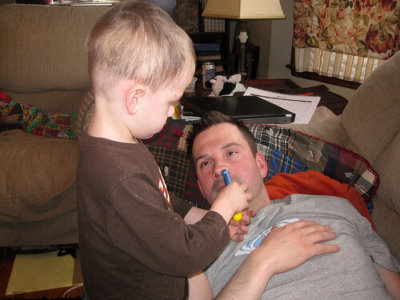How to Cope When Your Child Has a Chronic Illness
Finding out your child has a chronic illness is a daunting, unexpected experience for any parent.
And what with learning how to handle your sick child’s new needs and requirements, to managing the effects a chronically ill sibling has on your other children, it can be easy to overlook your own wellbeing.
The psychological effects of a child’s chronic illness on the parent
It’s important to be aware of how you might be emotionally and mentally affected by your child’s recent diagnosis. Awareness can mean you know to seek help if things become too stressful, and are more likely to recognise that what you are going through is normal, given your circumstances.
Common challenges of raising a chronically ill child can include:
Emotional highs and lows. Seeing your child suffer and knowing you can’t control it can lead to feelings of helplessness, frustration, rage, and despair.
Guilt. Despite knowing it’s not your fault, you might still feel guilty. Or you might feel guilt that you aren’t doing enough for your child (even when you are) or guilt that your other children now get less of you.
Stress. Knowing your child is suffering can play in the back of your mind, causing you stress even on good days. And taking care of a sick child takes time. This can mean the rest of your life feels crammed in or rushed, upping your stress levels yet again and meaning your old hobbies that helped you blow off steam drop off the list.
Low energy. Guilt and stress can leave you feeling less energised, as can practical challenges demands on your time and finances. And if these all add up to mild depression, this too can result in low energy.
Relationship tension. The way you and your partner want to manage your child’s illness might be different, resulting in all new stress and negotiating in your relationship. And other relationships, like those you have with your parents and friends, can also suffer. You might feel judged by them, or like they are not on your side or helping enough, or guilty if they are.
So how can one deal with all of the above? What are useful strategies for coping when you have a child with a health issue?
How to Stay Sane When Your Child Has Chronic Illness

By: Tony Alter
1. Communicate even when you don’t feel like it.
Talking to your partner can ensure you are both on the same page and are not blaming each other. Talking to siblings about their brother or sister’s illness can help them feel less jealous of your diverted attention. And talking to doctors until you have clarity can avoid more worry you don’t need.
Talking to your ill child about what is happening to them is also very important, stopping them from feeling scared and alone. If you are not sure how to approach talking to your kid about their illness, talk to your doctors who might have experience explaining conditions in a child-friendly way.
2. Drop assumptions.
Assuming we know what others think is the cause of unnecessary stress and sometimes paranoia and panic.
For starters, don’t assume you know what your child is thinking. Despite the fact you are his or her parent and might know your child best, they are still a separate individual with their own thoughts and feelings. Take the time to ask what they feel instead of trying to think for them.
And then don’t assume you know how others feel about your situation and child. The irrational guilt that a child’s illness can bring can cause an attitude of defensiveness that might have you pushing others away without giving them a chance.
3 Connect with others who get it.
You might not want to spend your increasingly rare spare time with other parents with an ill child when what you crave is time to forget about things. But it’s not just about sharing information and advice for coping, it’s also about keeping the self-blame at bay.
Connecting with others who are also struggling with similar issues reminds you that what you are experiencing is normal given your situation. Where as only surrounding yourself with people who don’t understand your situation can leave you feeling victimised and misunderstood.
4. Cut yourself some slack.
Make a conscious effort to be easy on yourself. Learn to watch for self-deprecating thoughts and comments. Ask your partner for support with this, or put in a few minutes a day to practice mindfulness to increase your self-awareness (mindfulness will have the knock-on affect of lowering your stress levels, too).

By: frankieleon
5. Talk about money.
How does this protect your psychological health? Debt and money-related depression are all too common.
It can seem gauche to talk about expenses when your child’s wellbeing is priceless.
But putting your head in the sand about the financial strain of an unwell child can lead to a huge amount of stress down the line. If you aren’t good with money, ask for help from a friend or professional who is.
6. Stick to routine.
Knowing the way your week works is one less stressful thing whirring around your mind. And the more you manage your time, the more likely it is you can find a slot to take regeneration time for yourself or give your other children much needed one-on-one attention.
A routine is also often very helpful to your child who is not well. Routine gives them a sense of normalcy they might desperately crave in the face of the changes illness can bring.
7. Work on boundaries.
It’s important to not let your child’s illness mean you lose sight of what you personally can and can’t allow in your life. Just because your child is not well does not mean you have to allow your bossy sister to come over non-stop.
Instead, see the changes in your family as a chance to learn how to set boundaries. Remember, saying no to others is often saying yes to yourself.
Health problems also doesn’t mean that you have to drop the boundaries of acceptable behaviour with your ill child. Limits and rules over coddling again offers much needed normalcy to your child.
8. Make self-care a priority.

By: Catherine
Try to remind yourself that taking care of yourself is really taking care of your child.
You will have more energy for them if you are feeling good. Trying to do everything to the point of exhaustion, on the other hand, may have your child picking up on your resentment or feeling responsible that you are so tired.
Book in time just for yourself each week, even if it’s only half an hour. And consider making exercise one of your options. Even the NHS now recommend exercise for emotional wellbeing, so it is time well spent.
9. Accept help.
Accepting help from friends and family can be a hard one if you are traditionally independent. But the more you can allow others to pitch in, the more energy you have available for your child.
Start to notice how often you reject offers of help and ask yourself, what if I said yes? Yes to that batch of bolognese the neighbour offered, yes to your brother-in-law offering to do the school run? How could I use that time for the wellbeing of my family?
And don’t be afraid of outside support. There are charities set up just to help families with sick children such as Well Child, which has a program called ‘Helping Hands’, a home improvement scheme to help your house be more suitable for your child’s needs. There are also charities like the Family Holiday Association, helping struggling families to afford a vacation, and the Rainbow Trust, who help families with a sick child with all manner of practical things, from going with you to appointments to taking siblings out for a day.
Consider outside help for your emotional health, too. Friends are family are great, but the unbiased perspective of someone who isn’t invested in your situation can be priceless when you are under psychological strain. If you can’t afford a private counsellor, your GP might be able to refer you or let you know about local support groups. Social media and online forums also offer further support and can help ease the feelings of fear and isolation.
What if you burnout?
Burnout can sneak up on you, meaning you suddenly can’t cope at all just when you are needed most. It’s important to recognise the signs of burnout and seek help if it’s happening to you.
Symptoms of burnout to look for include:
- A change in appetite and sleep patterns
- Withdrawal from friends and social events
- Depression
- Increased anger
- Increased anxiety
- Excessive crying
- Irritability or the feeling of being empty
- Forgetfulness
For those experiencing any of these symptoms it is important to speak to a GP who may recommend seeing a counsellor or therapist.
Do you have a tip for parents with a chronically ill child who are struggling to cope? Share it below.





